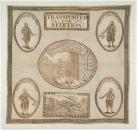The "Scottish Martyrs" were a loosely affiliated group of political reformers and activists transported to New South Wales in 1794, during a period when the British government under William Pitt undertook a number of repressive prosecutions aimed at crushing British radicalism, against the backdrop of the French Revolution across the channel. Not all of the "Martyrs" were Scottish, but all were involved in one way or another with radical societies which met in Edinburgh, Glasgow and Dundee, Scotland, in 1791-1793. Their convictions in Scotland were facilitated by Lord Braxfield, a fiercely conservative and notoriously harsh judge, who was able to exploit peculiar Scottish laws which allowed the stacking of juries with members of a para-political conservative association.
The events of the French Revolution provoked considerable debate in Britain, and hastened calls for political and religious reform of various kinds, with the common point of contention being the widening of the electoral franchise and reform of the parliamentary system. Various radical societies, including the London Corresponding Society and the 'Society of the Friends of the People'. The membership of these societies consisted of tradesmen and artisans, as well as working-class members, but also included lawyers, dissenting clergymen, and others, and had sympathisers from a liberal intellectual elite, including in the parliamentary opposition led by Charles James Fox.
In December 1792, the Edinburgh Society for the Friends of the People held a general convention of reform societies, at which the idealistic lawyer Thomas Muir read an address from the increasingly radical Society of United Irishmen. For this act, and for his role in distributing the writings of Thomas Paine, Muir was convicted of sedition by a jury stacked by Braxfield, and given a sentence of fourteen years transportation – thought then to have been a de facto death sentence, and regarded as particularly harsh for a gentleman of Muir's standing.
 8148853622951862071.jpg
8148853622951862071.jpg